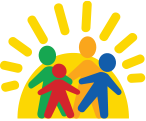Bright Futures
6 Month Visit
Here are some suggestions from Bright Futures experts that may be of value to your family.

How Your Family is Doing
- If you are worried about your living or food situation, talk with us. Community agencies and programs such as WIC and SNAP can also provide information and assistance.
- Don’t smoke or use e-cigarettes. Keep your home and car smoke-free. Tobacco-free spaces keep children healthy.
- Don’t use alcohol or drugs.
- Choose a mature, trained, and responsible babysitter or caregiver.
- Ask us questions about child care programs.
- Talk with us or call for help if you feel sad or very tired for more than a few days.
- Spend time with family and friends.
Your Baby's Development
- Place your baby so she is sitting up and can look around.
- Talk with your baby by copying the sounds she makes.
- Look at and read books together.
- Play games such as peekaboo, patty-cake, and so big.
- Don’t have a TV on in the background or use a TV or other digital media to calm your baby.
- If your baby is fussy, give her safe toys to hold and put into her mouth. Make sure she is getting regular naps and playtimes.
Healthy Teeth
- Ask us about the need for fluoride.
- Clean gums and teeth (as soon as you see the first tooth) 2 times per day with a soft cloth or soft toothbrush and a small smear of fluoride toothpaste (no more than a grain of rice).
- Don’t give your baby a bottle in the crib. Never prop the bottle.
- Don’t use foods or juices that your baby sucks out of a pouch.
- Don’t share spoons or clean the pacifier in your mouth.
Feeding Your Baby
- Know that your baby’s growth will slow down.
- Be proud of yourself if you are still breastfeeding. Continue as long as you and your baby want.
- Use an iron-fortified formula if you are formula feeding.
- Begin to feed your baby solid food when he is ready.
- Look for signs your baby is ready for solids. He will
- Open his mouth for the spoon.
- Sit with support.
- Show good head and neck control.
- Be interested in foods you eat.
Starting New Foods
- Introduce one new food at a time.
- Use foods with good sources of iron and zinc, such as
- Iron- and zinc-fortified cereal.
- Pureed red meat, such as beef or lamb.
- Introduce fruits and vegetables after your baby eats iron- and zinc-fortified cereal or pureed meat well.
- Offer solid food 2 to 3 times per day; let him decide how much to eat.
- Avoid raw honey or large chunks of food that could cause choking.
- Consider introducing all other foods, including eggs and peanut butter, because research shows they may actually prevent individual food allergies.
- To prevent choking, give your baby only very soft, small bites of finger foods.
- Wash fruits and vegetables before serving.
- Introduce your baby to a cup with water, breast milk, or formula.
- Avoid feeding your baby too much; follow baby’s signs of fullness, such as
- Leaning back.
- Turning away.
- Don’t force your baby to eat or finish foods.
- It may take 10 to 15 times of offering your baby a type of food to try before he likes it.
Helpful Resources
Smoking Quit Line: 800-784-8669 | Poison Help Line: 800-222-1222 | Information About Car Safety Seats: www.nhtsa.gov/campaign/right-seat | Toll-free Auto Safety Hotline: 888-327-4236
Safety
- Use a rear-facing–only car safety seat in the back seat of all vehicles.
- Never put your baby in the front seat of a vehicle that has a passenger airbag.
- If your baby has reached the maximum height/weight allowed with your rear-facing–only car seat, you can use an approved convertible or 3-in-1 seat in the rear-facing position.
- Put your baby to sleep on her back.
- Choose crib with slats no more than 23⁄8 inches apart.
- Lower the crib mattress all the way.
- Don’t use a drop-side crib.
- Don’t put soft objects and loose bedding such as blankets, pillows, bumper pads, and toys in the crib.
- If you choose to use a mesh playpen, get one made after February 28, 2013.
- Do a home safety check (stair gates, barriers around space heaters, and covered electrical outlets).
- Don’t leave your baby alone in the tub, near water, or in high places such as changing tables, beds, and sofas.
- Keep poisons, medicines, and cleaning supplies locked and out of your baby’s sight and reach.
- Put the Poison Help line number into all phones, including cell phones. Call us if you are worried your baby has swallowed something harmful.
- Keep your baby in a high chair or playpen while you are in the kitchen.
- Don’t use a baby walker.
- Keep small objects, cords, and latex balloons away from your baby.
- Keep your baby out of the sun. When you do go out, put a hat on your baby and apply sunscreen with SPF of 15 or higher on her exposed skin.
What to Expect at Your Child's 9 month Visit.
We will talk about:
- Caring for your baby, your family, and yourself.
- Teaching and playing with your baby.
- Disciplining your baby.
- Introducing new foods and establishing a routine.
- Keeping your baby safe at home, outside, and in the car.
Consistent with Bright Futures: Guidelines for Health Supervision of Infants, Children, and Adolescents, 4th Edition
For more information, go to https://brightfutures.aap.org.